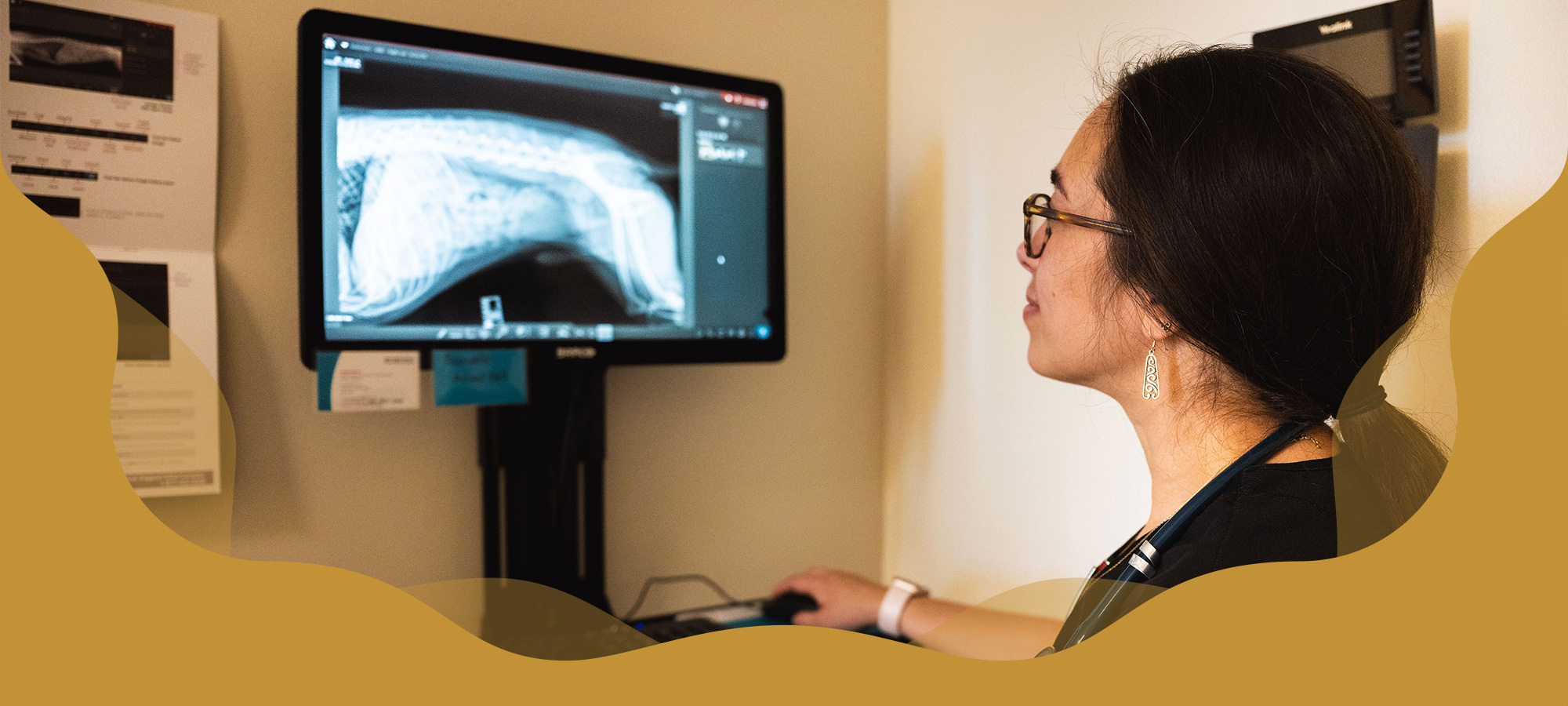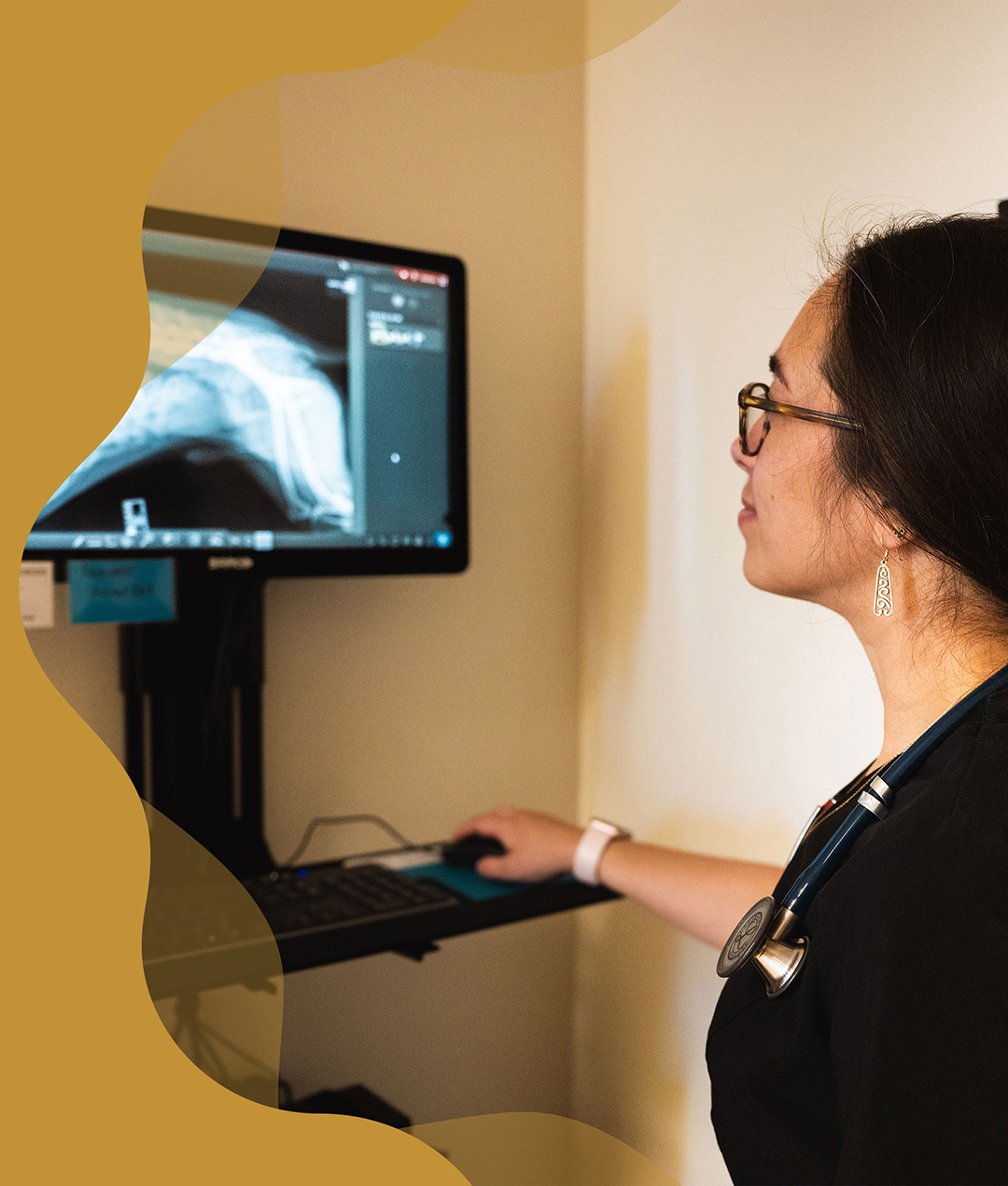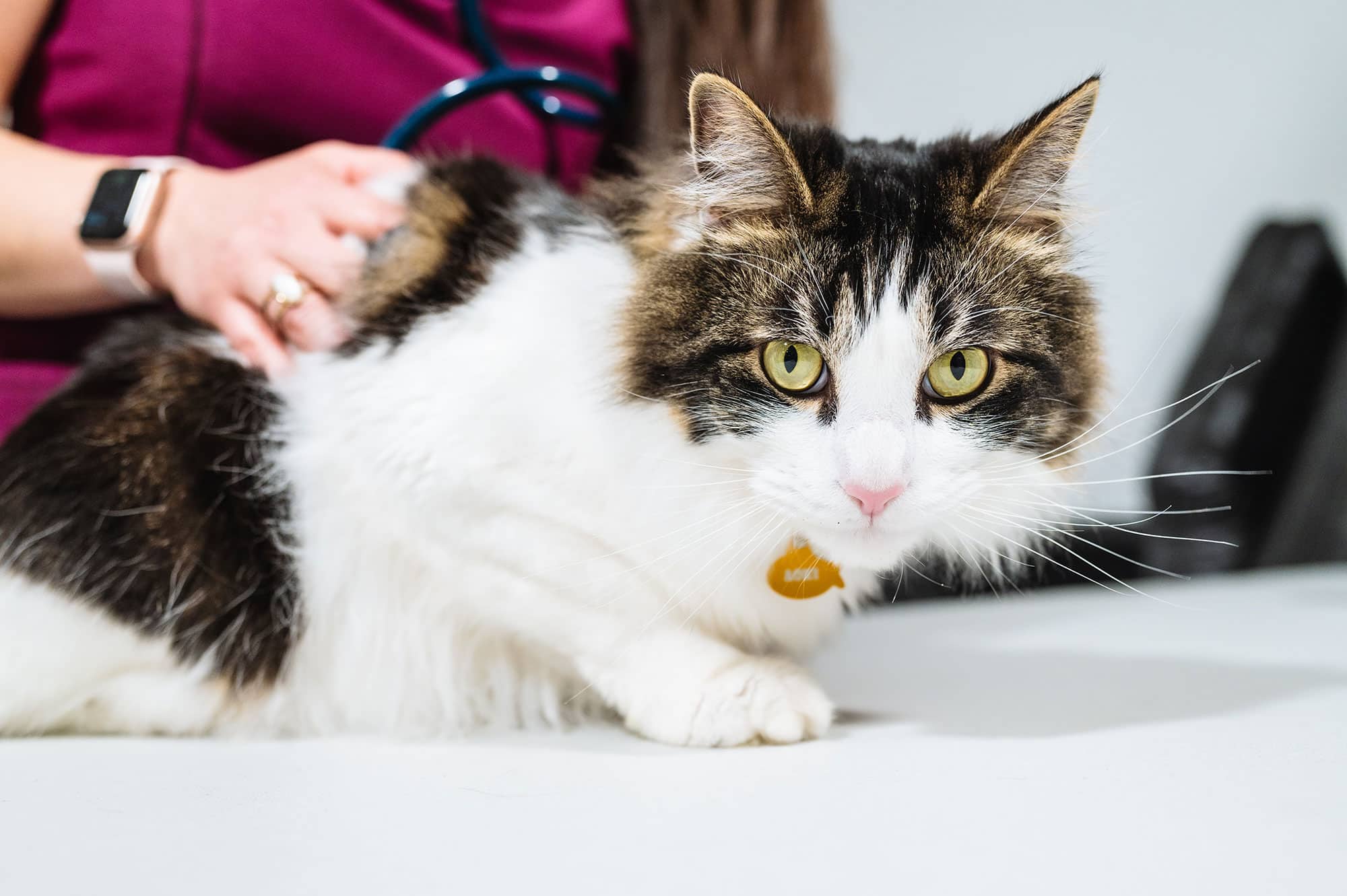
Urgent Vet Care in Austin, TX

Urgent Pet Care
Minor illnesses can develop unexpectedly, causing stress and concern for pet owners. At Meow Bark Veterinary, we understand the unpredictable nature of these situations and are committed to providing prompt, compassionate care when your pet needs it most. Our clinic allocates a number of urgent care appointment slots daily so we can accommodate the unexpected. Our operating hours for urgent care appointments are the same as all other appointments and will be based on availability. As such, urgent care is available on a first-come, first-serve basis. We are equipped to handle a wide range of minor medical conditions, ensuring your beloved pet receives the attention and expert treatment they deserve.

What is Urgent Veterinary Care?
A pet requires urgent care if they experience a minor illness or injury that does not require hospitalization but should not wait a few days to be evaluated. It covers a wide range of medical conditions, from small wounds and limping to vomiting and difficulty urinating. Unlike routine care, urgent veterinary care prioritizes rapid diagnosis and treatment to address the pet’s condition and prevent further complications. We strive to ensure that urgent care cases do not interfere with regular appointments; however, this may not always be possible, depending on the severity of the case. If an urgent case delays a pet’s appointment, we kindly ask for empathy and patience. You never know when you and your pet may be in the same situation.

Why is Urgent Veterinary Care Important?
Prompt veterinary attention can prevent minor issues from escalating into progressively worse conditions. Early intervention is key to managing and mitigating health complications, ensuring a better prognosis for your pet and potentially a less expensive veterinary bill. Knowing that expert care is readily available provides peace of mind for pet owners, allowing them to act swiftly and confidently.

How Is Urgent Veterinary Care Different From Emergency Veterinary Care?
The following are examples of illnesses that would benefit from an urgent care appointment if noted:
- Minor cuts or wounds: These are superficial injuries where the skin is broken, causing mild bleeding or oozing. They can result from accidents, fights, or self-inflicted. Urgent care involves cleaning the wound, assessing its depth, and possibly suturing or bandaging if necessary to prevent infection and promote healing. Antibiotics or pain relief may be prescribed based on severity.
- Vomiting: Vomiting in pets can occur due to various reasons such as dietary indiscretion (eating something inappropriate), infections, parasites, or underlying medical conditions. The focus is on identifying the cause through history, physical examination, and possibly diagnostic tests like blood work or X-rays. Treatment may include fluid therapy, medications to control vomiting, and dietary management.
- Diarrhea: Diarrhea is characterized by loose, watery stools and can be caused by dietary changes, infections, parasites, or underlying health issues. Treatment involves identifying and addressing the underlying cause. This may include fecal testing to check for parasites, dietary management (e.g., bland diet), fluid therapy to prevent dehydration, and medications to control diarrhea or treat infections.
- Limping: Limping or lameness can result from soft tissue injuries (sprains or strains), bone issues (fractures, cancers, or infections), joint issues (arthritis), or neurological conditions affecting the spine or limbs. Urgent care involves a thorough examination to pinpoint the cause of limping. Diagnostics may include X-rays, or we may refer a pet for advanced imaging (CT/MRI) to further investigate the cause of lameness. Blood work will be recommended to evaluate internal organ function for medication metabolism and look for possible infection. Treatment may include medications, supplements, and/or physical therapy to ensure a pet is not living in pain.
- Coughing: Coughing in pets can be caused by respiratory infections, allergies, heart disease, or even foreign objects lodged in the throat. Urgent care focuses on determining the cause of coughing through examination and diagnostic tests (e.g., X-rays blood work). Treatment may involve medications (such as antibiotics for infections or cough suppressants), managing underlying conditions (like heart disease), or environmental changes (for allergies).
- Eye or ear discomfort: Pets may show signs of discomfort such as rubbing or pawing at the eyes or ears, squinting, discharge, and hair loss. Urgent care includes examining the affected area thoroughly to identify issues like infections, wounds, or allergies. Diagnostics may include ear cytology, corneal stains, tear testing, and checking eye pressures. Treatment may involve cleaning ears, medicating (e.g., antibiotics, antifungals), flushing out debris, and providing pain relief or anti-inflammatory medications. An e-collar may be recommended to prevent further trauma.
- Facial swelling: Swelling of the face in pets can occur due to allergic reactions, insect bites, dental abscesses, or trauma. Urgent care involves identifying the cause through a thorough history, examination, and diagnostic testing. Treatments may include antihistamines and/or fluids in case of mild allergic reactions. Antibiotics and a dental cleaning may be indicated if facial swelling is caused by an infection such as a tooth root abscess. The severity of the case may warrant transfer to a 24-hour veterinary emergency facility.
- Difficulty urinating: Difficulty urinating can indicate urinary tract infections, bladder stones, urinary blockages (more common in male cats), or other urinary tract issues. Urgent care involves assessing the pet’s ability to urinate and determining the underlying cause through examination, urine tests, and imaging (like ultrasound). Treatment may include medications to relieve discomfort, treat infections, and manage stones. The severity of the case may warrant transfer to a 24-hour veterinary emergency facility.
Secure Your Pet’s Path to Wellness
The following are examples of emergencies, and your pet should be taken to an emergency facility if noted:
- Ingestion of Toxic Substances: Pets are naturally curious and may ingest harmful substances such as household chemicals, medications, or toxic plants. Symptoms may include vomiting, diarrhea, drooling, seizures, or lethargy.
- Severe Injuries or Trauma: Accidents such as being hit by a car, falls, and fights with other animals can result in severe injuries. Common signs include significant bleeding, limping, swelling, and obvious fractures.
- Difficulty Breathing: Breathing difficulties can arise from various causes, including allergic reactions, asthma, respiratory infections, or obstructions. If your pet is struggling to breathe, showing signs of choking, or exhibiting rapid, shallow breathing, it requires immediate veterinary attention at an emergency facility.
- Multiple seizures: seizures can indicate a serious underlying health issue. These symptoms could result from infections, metabolic disorders, or neurological problems. If your pet has multiple seizures in one day or a seizure lasting longer than 5 minutes, please take the pet to an emergency facility.
- Heatstroke: This is a life-threatening condition that can happen to any pet with extended activity in hot weather. Signs of heatstroke in a hot environment include bright red gums, vomiting, lethargy or stupor, unexplained bruising, and collapse.
- Snake bites: There are many different types of snakes in our region, and some are venomous. Venomous snake bites can cause anything from local tissue damage to shock and quick death. If you see your pet get bitten by a snake, or if you suspect that your pet has been bitten by a snake within the past 8-12 hours, please seek emergency care.
What to Do if Your Pet Has an Emergency
Immediate Steps to Take
- Remain Calm and Assess the Situation: It’s essential to stay calm during a pet emergency. Take a moment to assess the situation and determine the severity of your pet’s condition. Look for signs of distress, injury, or unusual behavior that may indicate a serious problem.
- If you are not sure whether your pet is experiencing an urgent matter or a true emergency, contact Meow Bark Veterinary.
- Below are nearby veterinary emergency clinics:
- 24-hour Emergency Veterinary Hospitals
- Veterinary Emergency Group (VEG)
- Address: 4211 S Lamar Blvd Suite A-10, Austin, TX 78704
- Phone: (737) 243-9408
- Central Texas Veterinary Specialist and Emergency Hospital (CTVSEH)
- Address: 4434 Frontier Trail, Austin, TX 78745
- Phone: (512) 892-9038
- Pet Specialist of Austin
- Address: 3901 Guadalupe St, Austin, Texas 78751
- Phone: (737) 241-5756
- Violet Crown Veterinary Specialists
- Address: 14360 Falcon Head Blvd Ste. 140, Bee Cave, TX 78738
- Phone: (512) 284-2877
- Austin Veterinary Emergency and Specialists (AVES)
- Address: 7300 Ranch Rd 2222 Bldg 5, Suite 100, Austin, TX 78730
- Phone: (512) 343-2837
- Veterinary Emergency Group (VEG)
- 24-hour Emergency Veterinary Hospitals
-
- Urgent Care
- VCA Urgent Care – South Austin
- Address: 8400 Brodie Ln, Austin, TX 78745
- Phone: (737) 284-2488
- Hours: 10am-8pm Mon-Sat
- VCA Urgent Care – South Austin
- Urgent Care
Basic First Aid Tips for Pet Owners
For minor wounds, apply gentle pressure with a clean cloth to stop bleeding. In case of choking, carefully check your pet’s mouth and remove any visible obstructions if it’s safe to do so. Always consult with a veterinarian for proper guidance and treatment following any first aid measures.
Transportation Tips for Injured Pets
Transporting an injured pet requires care and caution to prevent further harm to your pet and you. A painful pet can bite even their loved ones, so use a basket muzzle when possible to prevent injury to yourself. Use a sturdy carrier or a makeshift stretcher to support your pet’s body. Keep them as still and comfortable as possible during transport. Avoid sudden movements and drive carefully to ensure a smooth ride to the veterinary clinic.

Schedule an Urgent Veterinary Appointment in Austin, TX
Don’t wait—if your pet is experiencing a minor illness, contact us immediately to schedule an urgent vet appointment at Meow Bark Veterinary in Austin, TX. We understand that unexpected illness can be stressful, and we’re here to provide the urgent care your pet needs when it matters most.